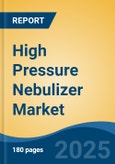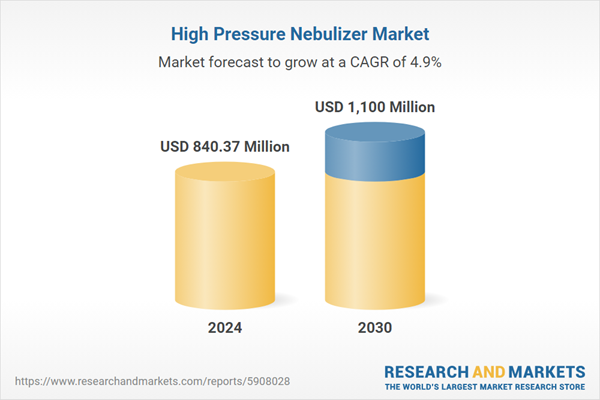Speak directly to the analyst to clarify any post sales queries you may have.
10% Free customizationThis report comes with 10% free customization, enabling you to add data that meets your specific business needs.
High-pressure nebulizers are medical devices designed to convert liquid medication into an aerosol mist for inhalation by patients suffering from various respiratory conditions, including asthma, chronic obstructive pulmonary disease (COPD), and cystic fibrosis. One of the primary factors contributing to the expansion of the global high-pressure nebulizer market is the rising incidence of respiratory disorders worldwide. As the global population ages and environmental factors such as pollution continue to worsen, the prevalence of respiratory diseases is on the rise. High-pressure nebulizers offer an efficient and convenient way to deliver medication directly to the lungs, making them a crucial tool in managing these conditions.
Key Market Drivers
Rising Prevalence of Respiratory Diseases
The rising prevalence of respiratory diseases is a key driver fueling the growth of the global high-pressure nebulizer market. In recent years, there has been a noticeable increase in the incidence of respiratory conditions such as asthma, chronic obstructive pulmonary disease (COPD), and cystic fibrosis worldwide. Several factors contribute to this upward trend, including urbanization, environmental pollution, smoking habits, and an aging population.According to the World Health Organization (WHO), respiratory diseases represent a significant global health challenge, with over 339 million people suffering from asthma alone. COPD is projected to become the third leading cause of death globally by 2030, underscoring the urgent need for effective respiratory treatments.
High-pressure nebulizers play a crucial role in managing these respiratory disorders by delivering medication directly to the lungs in the form of an aerosol mist. This targeted delivery mechanism ensures that the medication reaches the affected areas efficiently, providing relief and improving patients' overall quality of life.
For instance, a May 2022 article published in Public Health Front highlighted the high incidence of tuberculosis (TB) cases in Spain, particularly among individuals with type-2 diabetes mellitus, who were more susceptible to TB. This rising TB burden is driving demand for respiratory devices, thereby fueling the growth of Spain's respiratory devices market. Similarly, a March 2022 article in NPJ Primary Care Respiratory Medicine reported significant variations in asthma prevalence across European countries. It estimated Spain’s asthma prevalence to range between 2.5% and 13.5%, with rates in Barcelona specifically reported between 6.3% and 6.6%. The increasing prevalence of respiratory disorders in Spain continues to drive demand for respiratory devices, supporting market growth.
Key Market Challenges
Regulatory Hurdles
One of the primary challenges in the high-pressure nebulizer market is the complexity of compliance requirements. Manufacturers must adhere to a myriad of regulations, including quality control standards, safety guidelines, and product testing protocols. These regulations vary from one country to another, and the process of ensuring compliance can be time-consuming and costly.The need to meet these multifaceted requirements can slow down product development and market entry. High-pressure nebulizers are medical devices that directly impact patient health. Consequently, they are subject to rigorous safety and efficacy standards. Manufacturers must conduct extensive testing and clinical trials to demonstrate the safety and effectiveness of their products. Meeting these standards is a necessary and commendable aspect of healthcare, but it can also present significant challenges in terms of both time and financial resources.
Key Market Trends
Growing Awareness of Respiratory Health
The growing awareness of respiratory health is emerging as a significant driver fueling the expansion of the global high-pressure nebulizer market. In recent years, there has been a notable increase in public consciousness regarding the importance of respiratory well-being, thanks to various healthcare campaigns, educational initiatives, and the dissemination of information through digital channels.People are becoming increasingly cognizant of the risks associated with respiratory conditions, such as asthma, chronic obstructive pulmonary disease (COPD), and cystic fibrosis, which affect millions of individuals worldwide. Environmental factors, pollution, smoking habits, and an aging population contribute to the rising prevalence of these disorders. This heightened awareness has led individuals to seek medical advice and explore treatment options that can effectively manage their respiratory health.
High-pressure nebulizers have gained prominence in this context due to their ability to deliver medication directly to the lungs, offering targeted and efficient treatment for respiratory conditions. Patients and healthcare providers recognize the value of these devices in providing relief from symptoms and improving overall quality of life. High-pressure nebulizers have thus become a focal point in the conversation about respiratory health management.
Key Market Players
- FINESTFOG GmbH.
- SHKSHOP24.DE
- xtraPART GmbH
- Aero Pump GmbH
- Agrinova GmbH
- Agroplast Marcin Lopag.
- Albert Kuhn GmbH & Co. KG
- Advanced Sterilization Products (ASP)
- Birk GmbH
- Breuer & Co. Handelsgesellschaft mbH
Report Scope:
In this report, the Global High Pressure Nebulizer Market has been segmented into the following categories, in addition to the industry trends which have also been detailed below:High Pressure Nebulizer Market, By Application:
- Mechanical Engineering
- Automotive Industry
- Aerospace
- Oil And Gas
- Chemical Industry
- Medical Technology
- Electrical Industry
High Pressure Nebulizer Market, By Type:
- Ultrasonic Type
- Mesh Type
High Pressure Nebulizer Market, By Region:
- North America
- United States
- Canada
- Mexico
- Europe
- France
- United Kingdom
- Italy
- Germany
- Spain
- Asia-Pacific
- China
- India
- Japan
- Australia
- South Korea
- South America
- Brazil
- Argentina
- Colombia
- Middle East & Africa
- South Africa
- Saudi Arabia
- UAE
- Egypt
Competitive Landscape
Company Profiles: Detailed analysis of the major companies present in the Global High Pressure Nebulizer Market.Available Customizations:
With the given market data, the publisher offers customizations according to a company's specific needs. The following customization options are available for the report.Company Information
- Detailed analysis and profiling of additional market players (up to five).
This product will be delivered within 1-3 business days.
Table of Contents
Companies Mentioned
- FINESTFOG GmbH.
- SHKSHOP24.DE
- xtraPART GmbH
- Aero Pump GmbH
- Agrinova GmbH
- Agroplast Marcin Lopag.
- Albert Kuhn GmbH & Co. KG
- Advanced Sterilization Products (ASP)
- Birk GmbH
- Breuer & Co. Handelsgesellschaft mbH
Table Information
| Report Attribute | Details |
|---|---|
| No. of Pages | 180 |
| Published | March 2025 |
| Forecast Period | 2024 - 2030 |
| Estimated Market Value ( USD | $ 840.37 Million |
| Forecasted Market Value ( USD | $ 1100 Million |
| Compound Annual Growth Rate | 4.8% |
| Regions Covered | Global |
| No. of Companies Mentioned | 10 |









